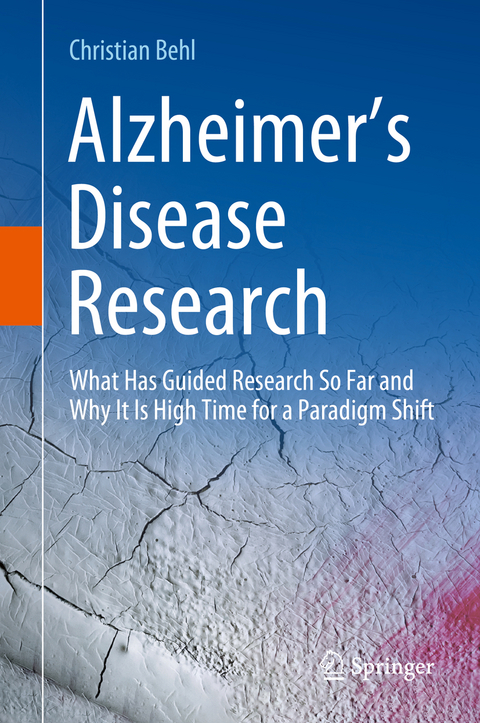
Alzheimer’s Disease Research
Springer International Publishing (Verlag)
978-3-031-31569-5 (ISBN)
This book highlights the key phases and central findings of Alzheimer's Disease research since the introduction of the label 'Alzheimer's Disease' in 1910. The author, Christian Behl, puts dementia research in the context of the respective zeitgeist and summarizes the paths that have led to the currently available Alzheimer's drugs. As the reader is taken through the major developments in Alzheimer's Disease research, particularly over the past thirty years, Behl poses critical questions: Why are the exact causes of Alzheimer's Disease still in the dark, despite all the immense, worldwide research efforts in academia as well as in the pharmaceutical industry? Why has the majority of an entire research field kept focusing on a single hypothesis that establishes the deposition of the amyloid beta peptide in the brain as the key trigger of Alzheimer's pathology, even though this concept has still not been convincingly proven in the clinics? Are there other hypotheses that might explainthe pathogenesis of this complex brain disease, and if so, why were these perspectives not adequately followed?
In this book, Behl tries to answer these questions. Starting with the historical background, the author illustrates the long and arduous research journey, its numerous setbacks, and the many alternative explanations for the disease, which have started gaining increasing attention and acceptance in the Alzheimer's research community only more recently.
With his deep dive into the history and progression of this research, including the most recent developments, Behl explains why he believes that it is high time to promote a paradigm shift in Alzheimer's Disease research.
lt;p>Christian Behl is Professor of Pathobiochemistry and Director of the Institute of Pathobiochemistry at the University Medical Center of the Johannes Gutenberg University Mainz, Germany. He has been closely following Alzheimer's Disease research since the early 1990's, when he first got involved into the field himself during his time at the Salk Institute for Biological Studies, La Jolla, USA. He stayed active in the field all through his research station at the Max Planck Institute of Psychiatry, Munich, Germany, and later in Mainz. There his current research (in Mainz) focuses on the cellular degradation mechanism autophagy in the context of neurodegeneration and aging. For quite some time Behl has been an active advocate for widening the focus of Alzheimer's Disease research to improve the understanding of this complex, age-related brain disorder. Behl is member of several scientific boards, including the German Alzheimer Foundation.
Chapter 1. Introduction.- Chapter 2. The Psychiatrist and Pathologist Aloysius Alzheimer and His Seminal Findings.- Chapter 3. Alzheimer's Disease Research After 1945: The Recommencement.- Chapter 4. Alzheimer's Research Goes Deeper - Ultrastructural Electron Microscopy Studies.- Chapter 5. Focus on Neurochemistry Led to the Cholinergic Hypothesis of Alzheimer's Disease.- Chapter 6. The Glutamatergic-Hypothesis of Alzheimer's Disease.- Chapter 7. Biochemistry and Genetics Points Out a Prime Suspect for Causing Alzheimer's Disease.- Chapter 8. Getting to the Bottom of It: Amyloid Beta Peptide Is Derived from a Larger Precursor.- Chapter 9. Step by Step Towards an Amyloid Beta Peptide-Based Hypothesis of Alzheimer's Disease.- Chapter 10. Concerns about the Amyloid Cascade Hypothesis and Reappraisals.- Chapter 11. Ignorance or Conspiracy? Or Just an Amyloid Firewall that Blocks Alternative Ideas?.- Chapter 12. In the Slip Stream of Amyloid: The Tau and Tangle Hypothesis.- Chapter 13. Focus on Tauopathies and Beyond.- Chapter 14. Alzheimer's Research Gains Momentum and Spreads Out.- Chapter 15. The Amyloid Cascade Hypothesis Has to Deliver, Finally.- Chapter 16. Beyond APP, PSEN1, PSEN2, and APOE: What Else Does the Genome Tell Us? Chapter 17. Alternative Hypotheses and Observations that were Somehow Lost on the Way.- Chapter 18. Is the Persistence of the Amyloid Cascade Hypothesis a Result of Constant Confirmation Bias?.- Chapter 19. Driving Forces of Alzheimer's Research Directions.- Chapter 20. Thirty Years after the Launch of the Amyloid Cascade Hypothesis: Is There a Shift of Gears at Last?.- Chapter 21. "If You Change the Way You Look at Things, Things You Look at Change".
"The depth of facts and explanatory figures will enlighten experts in Alzheimer's disease (AD) research, students, and journalists. We know of no other work that reaches the scope of scholarship of this volume." (George Perry and Rudolph Castellani, Journal of Alzheimer's Disease, June 20, 2024)
"This book ... represents a tour de force of almost 700 pages written by a leading contributor to the field over the last three decades, Christian Behl. ... The text is extremely thoroughly referenced, and the author describes his literature research process in detail." (Anthony J. Turner, Journal of Neurochemistry, October 14, 2023)
“This book ... represents a tour de force of almost 700 pages written by a leading contributor to the field over the last three decades, Christian Behl. ... The text is extremely thoroughly referenced, and the author describes his literature research process in detail.” (Anthony J. Turner, Journal of Neurochemistry, October 14, 2023)
| Erscheinungsdatum | 15.07.2023 |
|---|---|
| Zusatzinfo | XXV, 652 p. 116 illus., 107 illus. in color. |
| Verlagsort | Cham |
| Sprache | englisch |
| Maße | 155 x 235 mm |
| Gewicht | 1175 g |
| Themenwelt | Geisteswissenschaften ► Psychologie ► Allgemeine Psychologie |
| Medizin / Pharmazie ► Medizinische Fachgebiete ► Neurologie | |
| Medizin / Pharmazie ► Studium | |
| Naturwissenschaften ► Biologie | |
| Schlagworte | agenda setting • Alzheimer • Alzheimer Clinics • Alzheimer's disease • Alzheimer Therapy • Amyloid • Amyloid-Cascade-Hypothesis • Amyloid Plaques • Aternative Hypotheses • dementia • risk factors • Tau |
| ISBN-10 | 3-031-31569-3 / 3031315693 |
| ISBN-13 | 978-3-031-31569-5 / 9783031315695 |
| Zustand | Neuware |
| Informationen gemäß Produktsicherheitsverordnung (GPSR) | |
| Haben Sie eine Frage zum Produkt? |
aus dem Bereich


